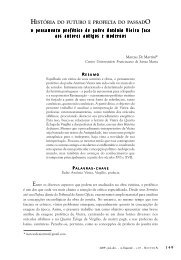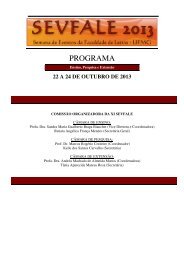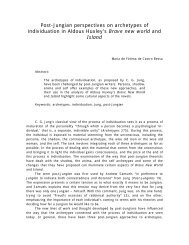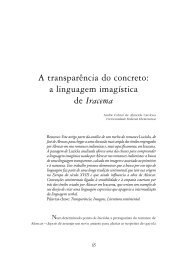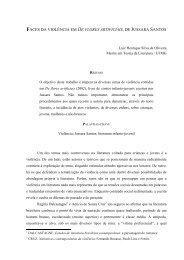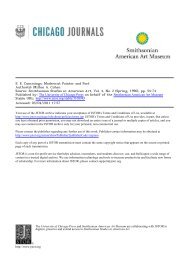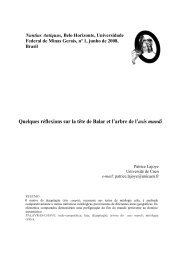Contornos do Indizível: o estilo de Clarice Lispector - Fale - UFMG
Contornos do Indizível: o estilo de Clarice Lispector - Fale - UFMG
Contornos do Indizível: o estilo de Clarice Lispector - Fale - UFMG
You also want an ePaper? Increase the reach of your titles
YUMPU automatically turns print PDFs into web optimized ePapers that Google loves.
Em Tese, Belo Horizonte, v. 10, p. 60-66, <strong>de</strong>z. 2006<br />
Although Lahiri explores the diverse experience of both men and women in<br />
diaspora in her short stories, it is in her novel that this issue is better <strong>de</strong>veloped. Very<br />
often we have the feeling that some of the immigrant experiences explored by Lahiri in<br />
her novel can be a <strong>de</strong>velopment of one or more of her short stories, at the same time<br />
that it produces the opposite effect, that is, the short stories seem to complete her<br />
narrative in the novel. As an example, we can see that Lahiri suggests that the<br />
transaction of women in the practice of arranged marriages has prece<strong>de</strong>d the migration<br />
of all Indian women in her short stories, but it is in her novel that she <strong>de</strong>scribes this<br />
event when she gives, on the first pages of The Namesake, a <strong>de</strong>tailed account of<br />
Ashima’s experience. An obedient daughter, and <strong>de</strong>dicated mother and wife, Ashima is<br />
about to give birth to her first child in a hospital in the United States, as the narrator<br />
brings back images of her past in India and of the day she first met her husband. He<br />
had been the third man to whom she had been offered. The <strong>de</strong>scription of his visit to<br />
Ashima’s house illustrates the way marriage is arranged like a <strong>de</strong>al in which women<br />
become commodities:<br />
Ashima had paused in the corri<strong>do</strong>r. She could hear her mother saying, “She is fond of<br />
cooking, and she can knit extremely well. Within a week she finished this cardigan I am<br />
wearing.” Ashima smiled, amused by her mother’s salesmanship; it had taken her the<br />
better part of a year to finish the cardigan, and still her mother had to <strong>do</strong> the sleeves.<br />
(Namesake 7)<br />
Also, it is in her novel that Lahiri explores the intertwining of the experience of<br />
being a woman and an immigrant as she <strong>de</strong>scribes Ashima going through the<br />
experience of pregnancy. When Ashima is in hospital waiting to give birth to her first<br />
child, she reflects on her situation as an immigrant. She suffers from the pain of<br />
parturition but she <strong>do</strong>es not know if the most painful thing is the act of giving birth or<br />
the fact that she is an immigrant, a stranger in that land in which she <strong>do</strong>es not know<br />
the people around her. Likewise, she fails to un<strong>de</strong>rstand the subtleties of the English<br />
language. The narrator comments on the episo<strong>de</strong>:<br />
For being a foreigner, Ashima is beginning to realize, is a sort of lifelong pregnancy — a<br />
perpetual wait, a constant bur<strong>de</strong>n, a continuous feeling out of sorts. It is an ongoing<br />
responsibility, a parenthesis in what had once been ordinary life, only to discover that that<br />
previous life has vanished, replaced by something more complicated and <strong>de</strong>manding. Like<br />
pregnancy, being a foreigner, Ashima believes, is something that elicits the same curiosity<br />
from strangers, the same combination of pity and respect. (Namesake 49)<br />
During the narrative Ashima realizes the vanishing of her previous life, especially<br />
the emptying of traditions like the practice of arranged marriage and exchange of<br />
women when it is time for her children to get married. Now, in the space of diaspora,<br />
the territory is new and the tradition of arranged marriages is emptied of meaning. In<br />
an attempt to keep this tradition, Ashima faces the failure of her son’s marriage to a<br />
second-generation Indian and feels guilty for being the one who had encouraged their<br />
engagement. After this failure, she accepts the fact that her daughter Sonia has a<br />
mo<strong>de</strong>rn relationship to a “half-Jewish, half-Chinese” man. The acceptance of Sonia’s<br />
wedding is part of Ashima’s process of transformation in the space of diaspora. Even if<br />
she went to the United States only to accompany her husband, it is there that she<br />
finds the means to re-draw the frontiers that limited her space as a woman. After her<br />
husband’s <strong>de</strong>ath, Ashima starts working in a library, learns how to drive and offers<br />
Christmas parties to her neighbors. Although in the end of the novel she is preparing to<br />
go back to Calcutta, this movement <strong>do</strong>es not represent going back to the space of<br />
limitation, as we can observe when the narrator stresses the different woman Ashima<br />
Disponível em http://www.letras.ufmg.br/poslit<br />
63



